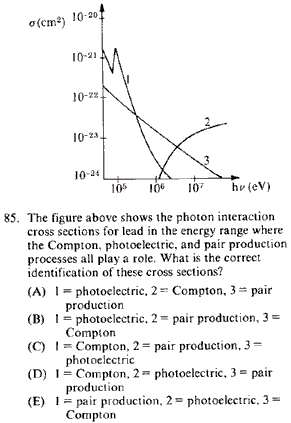|
GR8677 #85
|
|
|
Problem
|
|
 |
Advanced Topics }Nuclear Physics }Nuclear Physics
Pair production only occurs above a certain energy on the order of MeV. Thus, all except choices (B) and (C) remain.
The photoelectric effect is dominant for low energies, so its cross-section must be line (1). Choose choice (B).
|
|
|
Alternate Solutions |
| There are no Alternate Solutions for this problem. Be the first to post one! |
|
|
Comments |
alwayswright5214
2019-12-02 13:39:56 | Compton effect (Compton, 1923), named after its discoverer, the greatest photon energy loss occurs when it is scattered backward (180°) from its original direction. Then, if E is much larger than the rest energy of the electron E0 = me c2 = 0.511 MeV, it is found that the final photon energy E′ is equal to E0/2. www.dc-harvest.com/ |  | segfault
2009-08-28 22:02:42 | You can immediately identify 1 as the photoelectric effect because of its sharp peak at ~ . This peak is because the incident photons have high enough energy to excite atomic transitions of higher energies, thus the absorption spectra jumps up. (This is typically the K-edge; where K-shell electrons perform the photoelectric absorption). . This peak is because the incident photons have high enough energy to excite atomic transitions of higher energies, thus the absorption spectra jumps up. (This is typically the K-edge; where K-shell electrons perform the photoelectric absorption). |  | petr1243
2008-02-16 20:33:09 | pg.528 of Modern Physics(3rd edition) by Serway, has a good explanation of these 3 processes.
smokwzbroiplytowej
2008-10-26 19:49:11 |
For the common good:
"At low photon energies (less than about 0.5 MeV), the predominant process that removes photons from a beam is the photoelectric effect, in which a photon is absorbed and transfers all of its energy to an electron.
At intermediate photon energies, the predominant process is Compton scattering, in which the photon transfers some of its energy to an electron. Both the photoelectric effect and Compton scattering were discussed in Chapter 3.
At high energies, the predominant process is pair production, in which an electron-positron pair is created as a photon passes near a nucleus in the medium. Since the reset energy of the electron-positron pair is  (twice the rest energy of an electron), the gamma-ray photon must have at least this much energy to produce a pair. Pair production will be discussed further in Chapter 15." (twice the rest energy of an electron), the gamma-ray photon must have at least this much energy to produce a pair. Pair production will be discussed further in Chapter 15."
That being said, you probably shouldn't be studying for the GRE without your trusty Serway!
|
GreenApple
2008-11-05 00:43:04 |
smokwzbroiplytowej, thanks for the "common good". :-) It's helpful.
|
Setareh
2011-10-27 08:49:57 |
Thank you very much dear smokwzbroiplytowej. That was a great comment.
|
rahat90
2014-09-10 05:53:42 |
Thanks for the quick tips!
|
|  | Hagus
2006-10-30 05:29:35 | Correction: It should read, only choices B and C remain, or all except choices B and C are eliminated. |  |
|
|
|
|
The Sidebar Chatbox...
Scroll to see it, or resize your browser to ignore it... |
|
|
|
